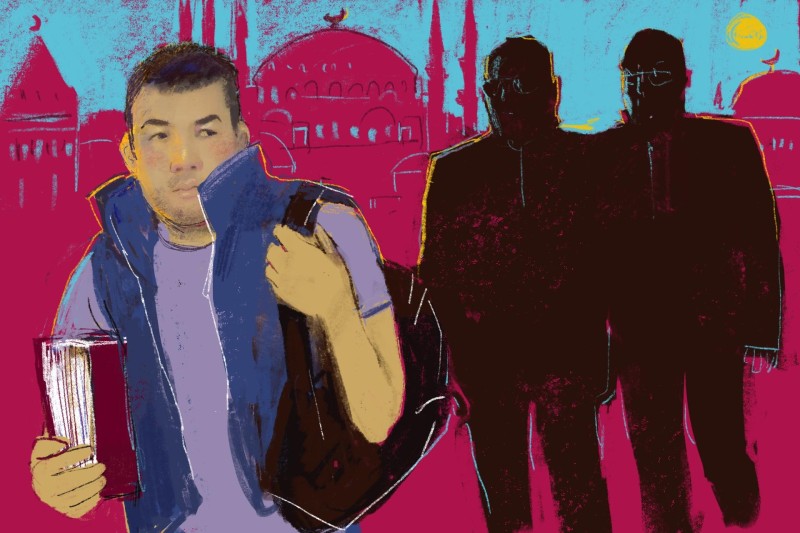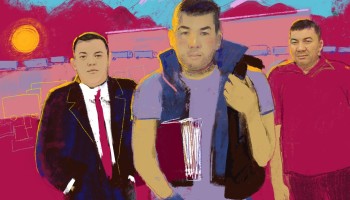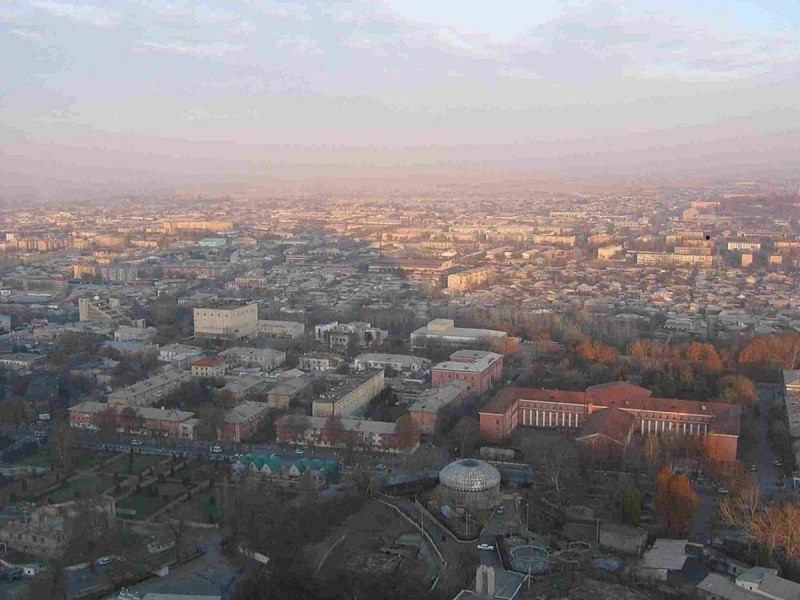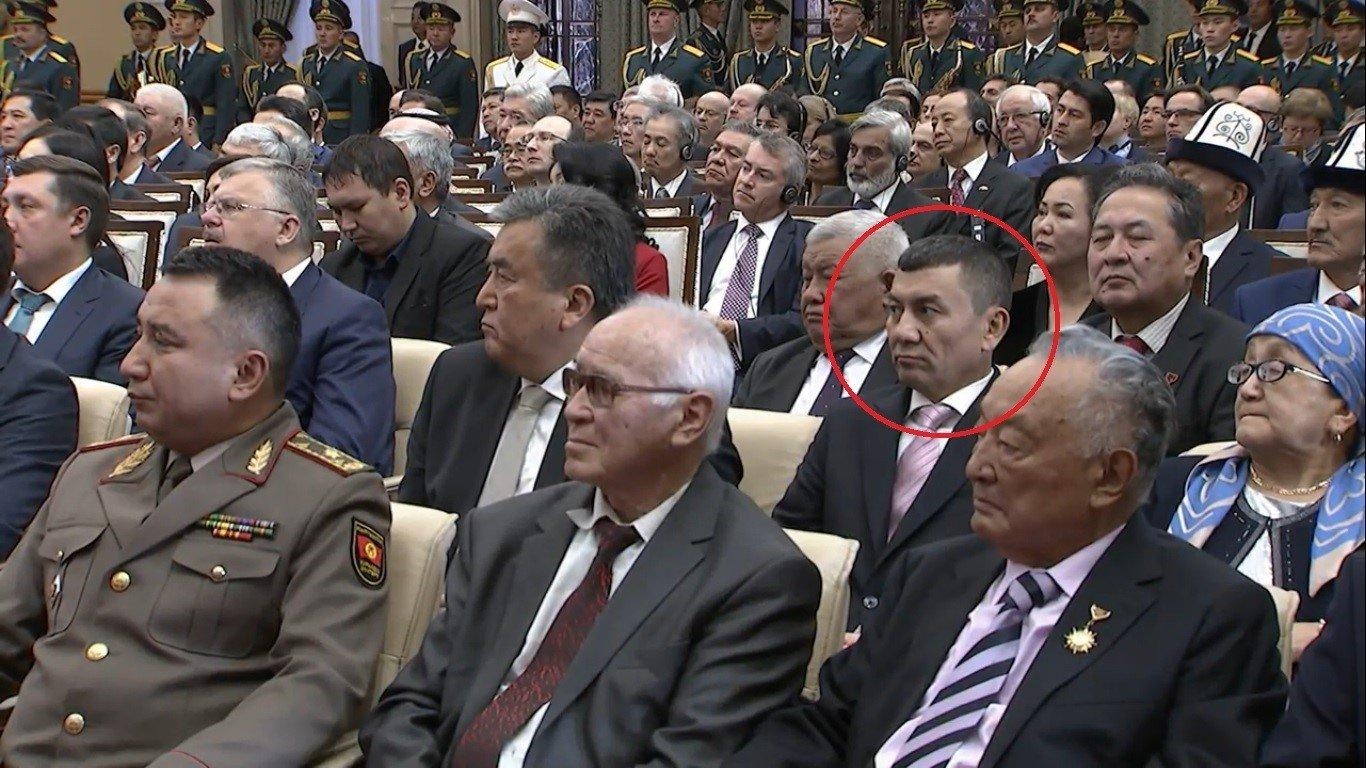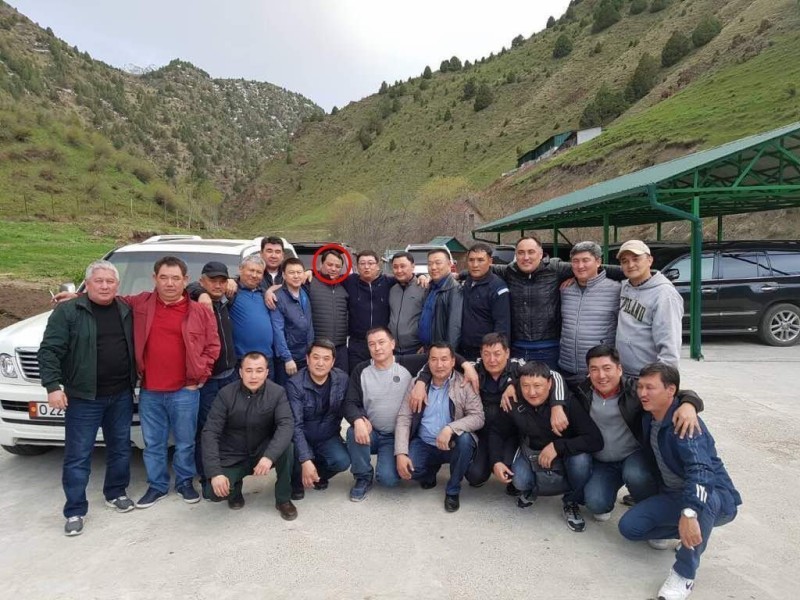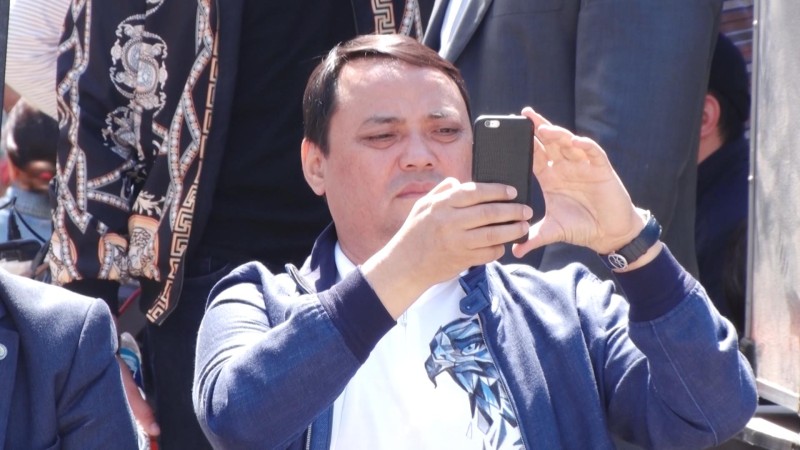On Istanbul’s European side, the Ottoman-era Çırağan Palace rises grandly above the waters of the Bosphorus. Once, the servants of Sultan Abdülâziz hurried up and down its marble halls. After a fire gutted the interior in 1909, it was left in ruins for years, its garden used as a football pitch.
Today, Çırağan hosts the Kempinski, a five-star hotel where the rich and ultra-rich dine on oysters, lounge by the infinity pool, and pose for photos in front of an ornate 17th-century gate.
But on one warm day in late October, a more unusual pair sat at an upscale Italian restaurant by the palace’s famous garden. The two men spoke for hours, occasionally glancing up to see if anyone was watching, with a pile of papers spread out on the table between them.
One was a journalist. The other was Aierken Saimaiti, a polite, talkative 37-year-old car rental agent who had arrived in Istanbul from his home in Kyrgyzstan two years earlier.
Nothing about Saimaiti’s appearance betrayed his many secrets. But just days earlier, one of his employees had been beaten to death back home. And now, worried for his own safety, he was ready to make his real business — and his clients — fully public.
By his own admission, Saimaiti was a professional money launderer. Within a span of five years, he was responsible for moving a staggering total — at least $700 million in wire transfers and cash — from Kyrgyzstan to a dozen countries across the world. To ensure secrecy, the wire transfers were backed by sham contracts and the cash flown by working-class couriers who declared it as their own. The operation represented a massive underground flow of money that is particularly striking considering that Kyrgyzstan is one of the poorest countries on earth.
Saimaiti kept detailed records which, over the course of several months in the spring and summer, he had begun to share. As his trust grew, so did the volume of the evidence he provided. Reporters from RFE/RL's Radio Azattyk, OCCRP, and its Kyrgyz member center, Kloop, spent months poring over his documents and conducting further research to corroborate as much as possible. The resulting investigation confirms many of Saimaiti’s central claims.
Much of the money he sent abroad, the reporting confirms, flowed into a network of companies run by Khabibula Abdukadyr, the 55-year-old, Chinese-born leader of a Uighur family so secretive that, until now, not a single photograph of its key members has appeared in the public domain.
Contracts provided by Saimaiti, as well as interviews with officials, traders, and businessmen, corroborate his claim that the source of the family’s millions was an underground system they operated that allowed them to move undeclared and falsely labeled goods from China into Kyrgyzstan, and then to bring them to market in bazaars across Central Asia and Russia.
The evidence suggests that none of this would be possible without high-level government connections. Particularly essential was the backing of Raimbek Matraimov, a former top Kyrgyz customs official widely seen as so powerful that he is essentially untouchable. And a considerable portion of the Abdukadyr family’s earnings were diverted to pay off an entire network of corrupt officials.
Saimaiti told the story of a network of patronage and corruption so pervasive that it not only deprived Kyrgyzstan’s impoverished people of much-needed public revenues, but dramatically undermined the rule of law.
But the effects aren’t limited to Central Asia. Much of this money — which Saimaiti was instrumental in moving — has poured into bank accounts and real estate investments in the United Arab Emirates, Europe, and the United States.
Requests for comment
After working with the Abdukadyr family for over five years, Saimaiti and his partners had a violent falling-out. Fearing for his life, he fled Kyrgyzstan in the spring of 2017, resettled in Istanbul, and continued to provide underground financial services for other clients.
Saimaiti never told reporters the full story of why he decided to go public about his previous work. But he made clear that the information he possessed could be extremely damaging to his former bosses.
“I found out about many of their documents, many of their businesses, about many corrupt people … [about] where they transferred their money,” he said. “All the … money was in my hands. I kept all the money. I controlled how much money was given to customs, how much was spent where, how much was paid for cargo and trucks, [and for] customs service people. All the documents were in my hands.”
On that October day by the shores of the Bosphorus, as he shared his latest and most telling batch of evidence, Saimaiti promised that more was yet to come. But he was a Chinese citizen and feared the possibility of extradition, particularly since there was an Interpol warrant out for his arrest. To protect himself, he had applied for Turkish citizenship and expected to receive it on November 14. Afterwards, he planned to play his final hand: providing a last set of records that would make the truth of his revelations impossible to challenge.
That day never came, and the meeting at Çırağan Palace proved to be the last. Two weeks later, on an early November night, Saimaiti was shot dead in a hotel cafe in the heart of Istanbul.
The First Steps
Though Kyrgyzstan is poor, its strategic location in the heart of Central Asia makes it a modern crossroads. A major thoroughfare in Bishkek, its capital city, is called Zhibek Zholu — the “Silk Road,” after the ancient trading route — and today the mountainous roads that snake across the country’s territory are filled with dusty trucks packed with Chinese wares.
The ancient southern city of Osh, known for its population of Uzbek merchants, is a particular draw for those interested in trade. Long associated with a Silk Road route from China to Europe, the city is still today known for its colorful markets and ethnic diversity.
It was to this region in the fertile Fergana Valley that a 17-year-old Aierken Saimaiti arrived from Ürümqi, the capital of China’s Xinjiang region, in 1999. Though he told reporters little about his motivations, it’s no surprise that an ambitious young man might see the warm, diverse Kyrgyz city as an attractive destination.
In keeping with his life as a trader, Saimaiti was a polyglot, using a mixture of Turkish, Uzbek, and Kyrgyz in conversations with reporters. Though he knew Chinese, he never learned Russian, the region’s lingua franca, finding it difficult even to read text messages in Cyrillic.
According to several people who knew him well, Saimaiti initially worked as a vendor in the Kara-Suu bazaar, a densely packed maze of shipping containers and open-air stalls just a half-hour’s drive from Osh. That experience would have familiarized the young man with the import and export business, since the bazaar lies right next to the Uzbek border and is one of Kyrgyzstan’s most important trading centers.
It was about this time, Saimaiti said, that he began moving money to China for local merchants. He must have proven skilled and reliable, because soon Khabibula Abdukadyr came calling. In conversations with reporters, Saimaiti referred to this influential man as “Aji,” an honorific for Muslims who have made a pilgrimage to Mecca. He was the eldest Abdukadyr brother, and with Saimaiti’s help, he would build the underground system that would make them all rich.
“Who’s sharp in Osh?” the businessman is said to have asked local Uighurs, who directed him to the young Saimaiti. “The guys said it was me,” he said.
“He called me and said: ‘Brother, I’m also a Uighur from Artush [a city in China]. Let’s work together, you and I. Let’s do this and that,’” Saimaiti recounted. “Then I said, ‘You’re a great man, I’ll show you everything,’ and took him to the bank. I showed him that he can do it like this and like that.”
Abdukadyr must have been impressed, because he offered Saimaiti a partnership: In exchange for his help moving goods and money, the young man would get a cut of the profits.
Saimaiti was more than willing, and soon the millions started to flow.
Meet the Abdukadyrs
In neighboring Uzbekistan, which has more than five times Kyrgyzstan’s population, a sprawling market known as Abu Sahiy stretches along the ring road of the country’s capital, Tashkent.
According to Uzbek business records, the company that runs the market had, for years, been owned by Timur Tillyaev, a controversial businessman who is married to Lola Karimova, a daughter of the late President Islam Karimov.
In Saimaiti’s telling, a market of that name got its start in the late 1990s as a project led by his new boss, Abdukadyr. (This information could not be independently verified.)
Saimaiti said he heard from an Abdukadyr confidant that the market’s name originated as a joke.
“[Abdukadyr] brought together the Uighur traders and opened a bazaar. He asked the husband of [a prominent Uzbek singer]: ‘I’m opening a firm, why don’t you name it?’”
“‘How much will you give me?’ the man replied as a joke, and [Abdukadyr] handed him $1,000. That was a lot of money at the time. That’s when [the husband] said: ‘Turns out you’re a generous guy,’ and called it Abu Sahiy.” (The word sahiy means ‘generous’ in Uzbek, while Abu is short for Khabibula.)
While this story may be apocryphal, it is almost the only available glimpse into Abdukadyr’s personality and how he is viewed by others. The notoriously secretive man managed to remain virtually unknown until 2018, when one of his companies signed a widely-criticized — and since cancelled — agreement with the Kyrgyz government to develop a “smart city” project in Bishkek. To learn more, reporters followed his corporate paper trail across the world, finding a plethora of companies that seem to offer more questions than answers.
Abdukadyr’s Global Footprints
Company records link Abdukadyr to several companies that have operated in China, Kazakhstan, and Uzbekistan since the early 2000s.
According to Saimaiti, Abdukadyr’s ownership of the Abu Sahiy market didn’t last long. Shortly after establishing it, he exited the business and left Uzbekistan to spend time in Kazakhstan and Russia. When he returned, he established a cargo business also known as Abu Sahiy that would supply the market, now under the ownership of Timur Tillyaev, with goods.
The Monopolists
In the ensuing years, the Abdukadyr family developed Abu Sahiy into a cargo empire that delivered goods along the old Silk Road route from China.
To get a fuller picture of Abu Sahiy and how it operated, reporters reviewed company records in China, Kyrgyzstan, and Uzbekistan; interviewed officials and competitors; and visited customs terminals. The reporting paints a picture of an immensely profitable enterprise that depended, above all, on the Abdukadyr family’s alliance with customs officials.
Like many of its other institutions, Kyrgyzstan’s customs service has long been plagued by graft and corruption. But the case of the Abdukadyr family goes far beyond petty bribes. It was not simply a matter of slipping envelopes of cash to local officers at the moment the trucks crossed Kyrgyzstan’s borders.
Rather, the family developed a pre-arranged, highly organized system in which officials at various levels — from those working in the terminals all the way to their bosses — received portions of the proceeds. In return, they enabled the Abdukadyrs to achieve results that competitors said were impossible to match.
According to Saimaiti, Abu Sahiy trucks loaded with goods of all kinds made about 600 trips a month from China’s Xinjiang region into Kyrgyzstan, then to Tashkent and beyond.
Both Kyrgyz customs terminals on the Chinese border, Torugart and Irkeshtam, as well as the Kara-Suu terminal on the Uzbek border, employed enough friendly officers that they functioned almost as private facilities for the Abdukadyr family. Over a dozen businessmen described a customs regime in which only Abu Sahiy and associated cargo companies were able to get their trucks through the process quickly and efficiently. Competing firms faced delays and obstructions so severe that they found it difficult to stay in business.
“Nobody would give you cargo,” one of the businessman said. “Because yours would be expensive, and it would be difficult for you to get [your shipment] out of the terminal. That’s why some cargo companies barely function.”
A Big Haul
Saimaiti alleged on multiple occasions that the Abdukadyrs paid between $4,600 and $5,000 in bribes for each Abu Sahiy truck that crossed the border.
For the Abdukadyr family, their customs connections meant not only efficient processing, but the ability to evade customs fees. Friendly agents would clear their goods as textiles or other low-value commodities instead of more expensive products.
Another advantage was the opportunity to have some of their cargoes declared as “transit” goods headed for Uzbekistan rather than imports into Kyrgyzstan, a much cheaper way of getting Chinese goods into the country.
Many of these trucks did, in fact, bring goods to Uzbekistan for sale in Tashkent. But a significant portion unloaded their cargo at a facility the Abdukadyr family operated in the village of Kashgar-Kyshtak near the Uzbek border. The empty trucks then continued into Uzbekistan with their transit papers. Meanwhile, the goods they had unloaded were now available for sale in Kyrgyzstan or for export to more lucrative markets like Kazakhstan and Russia.
One driver employed by Abu Sahiy told reporters that, on several occasions, he had brought Chinese goods to Russia that used false paperwork showing that they had originated in Kyrgyzstan. “They made a document … that the goods had been purchased on the Dordoi market [in Bishkek],” he said. “In Moscow there is a large shopping center, Lublino. We unloaded [our cargo] in the back.”
Another version of the Abdukadyrs’ scheme made clever use of a business Saimaiti had established. By 2014, the young man had moved on from selling wares in someone else’s market to co-owning a bazaar of his own, a remote warren of hundreds of shipping containers called Noogardan-Atush near the Uzbek border.
Dashed Hopes
Abdyraz, the company that owned Saimaiti’s bazaar, was incorporated in 2011, and he acquired 60 percent of the business in 2014.
Through their Chinese companies, the Abdukadyr family signed contracts with Saimaiti’s company, Abdyraz, which operated the bazaar. The purpose of the contracts, which Saimaiti described as fraudulent, was to make it look like he was selling their goods there. In reality, these wares, too, were sent to other markets abroad.
“The goods were not sold [in Kyrgyzstan],” Saimaiti said. “They just make a document as if the goods were sold in my market ... But in reality, the goods go to Russia.”
Exporting Chinese goods to Russia or Kazakhstan as “Kyrgyz” wares is a way of avoiding Eurasian Economic Union (EEU) fees. The government of Kazakhstan, also an EEU member, has long complained of Chinese goods being smuggled into the country through Kyrgyzstan. And in 2016, a Kazakh court ruled that a Chinese company controlled by the Abdukadyrs supplied improper paperwork for cargo heading from China to Uzbekistan.
To corroborate these claims, Saimaiti provided reporters with five of the sales contracts. These documents, all signed within a span of just two months in 2014, show him agreeing to import a total of $114 million in textiles and other materials from China into Kyrgyzstan within a year.
By contrast, the total turnover of Saimaiti’s bazaar over the last six years was just $16.5 million, according to his business partner, Naziya Turdalieva. The discrepancy highlights the scale of the scheme Saimaiti operated for the Abdukadyr family.
And this scheme, too, benefitted from false customs clearances.
“For example, textiles are cheap. But clothes and shoes are expensive. [They] cost three dollars [to clear customs], but textiles cost 50 cents. They’ll write [a document], as if the textiles came to my firm,” Saimaiti explained. “They’ll take phones, but say it’s textiles. One phone costs six dollars [to clear customs]. If they clear one [truck of phones] as textiles, that’s $5,000. Give them $5,000 and [take] one [truck] of phones, drive it to Russia, and sell it. You can bankrupt any [competitor].”
“Raim Million”
A customs fraud scheme this sophisticated would be impossible without many loyal collaborators. But the green light would have to come from above.
The man Saimaiti implicated — repeatedly, insistently, and in multiple interviews — was Raimbek Matraimov, a powerful former deputy head of the customs service. This man, who has worked as a public official for most of his life, is notorious in Kyrgyzstan for his wealth, which has earned him the popular moniker “Raim Million.”
It was Matraimov, Saimaiti alleged, who was in charge of organizing the collection and distribution of the Abdukadyr family’s bribes.
Multiple sources provided similar accounts of Matraimov’s alleged role, though they declined to speak on the record, citing fear of repercussions. They include the owner of a cargo company, current and former customs officers, a former senior government official, a former minister, and an importer of foreign goods.
“Raim’s guys come [to the customs terminals] and collect [the money],” Saimaiti said, naming several people, including one who is now highly placed in the customs service.
In return, Saimaiti alleged, Matraimov guaranteed that the Abdukadyr family’s goods would continue to flow across the border unimpeded.
Saimaiti said that Matraimov himself also profited handsomely from the arrangement. In addition to taking a cut of the bribes, Matraimov received another portion directly from Saimaiti on Abdukadyr’s orders.
Though the total amount Matraimov received is unknown, Saimaiti shared with reporters one of the ledgers he said he used to keep track of his financial transfers. The document covers the period between August 2016 and February 2017.
“[Abdukadyr] said: ‘Send this here, send that there, and write that it went to [Matraimov],’ Saimaiti said. “So I wrote it, and I told the accountant, and he did the same.”
The table, which, Saimaiti explained, uses the column heading ‘Kergizstan RK’ to represent transfers to the Matraimov family’s charitable foundation in the country, shows a total of nearly $2.4 million being sent to the organization in seven payments.
Though Saimaiti’s ledger is homemade and somewhat haphazard, reporters were able to corroborate the Matraimov entries with financial documents. Two of these are original bank transfer slips under the name of Saimaiti’s wife, Wufuli Bumailiyamu, which confirm two transfers totalling $200,000 that were listed in the table. The others are digital photos or screenshots of wire transfer records from several companies.
Though the money was sent from multiple accounts under different names and from several countries, Saimaiti emphasized in multiple interviews that he was the curator of the payments. “[The money] was transferred under my watch,” he said. “It looked like charity donations.”
It’s not just the money transfers and Saimaiti’s testimony that connect Matraimov to the Abdukadyr family. Reporters found that the two families have a formal business partnership in Dubai. The former customs official’s wife purchased a plot of land in Dubai on which she, along with the Abdukadyrs, is developing a five-story mixed-used building, according to a leaked Dubai property database and other publicly available information.
Matraimov’s asset declarations, which he was required to make as a public official, do not paint a picture of a family that could afford investments of this size. But Saimaiti did say that large transfers to Dubai were among the transactions he carried out with Abdukadyr money, raising the question of whether this was another way the Matraimov family benefitted from their partnership.
The $700 Million Pipeline
The underground cargo empire the Abdukadyr network ran was immensely lucrative. Much of the more than $700 million Saimaiti handled over the span of about five years was theirs. His role, in exchange for a cut of the profits, was to make this money move.
A large portion of the funds, he said, originated from the network’s “cash desk” in Tillyaev’s Abu Sahiy market in Tashkent (Tillyaev’s lawyer confirmed that, at the time, the Abdukadyr family were one of his market’s suppliers, but denied the existence of this “cash desk.”)
But getting that Abu Sahiy money into Kyrgyzstan — Saimaiti’s base of operations — presented a challenge. At the time, Uzbekistan’s strict currency controls and financial regulations made it nearly impossible to move the money out of the country legally.
“That’s why the money went through the backdoors, was brought into Kyrgyzstan, and laundered through a Kyrgyz bank … No one knew this.”
The “backdoor” Saimaiti referred to was a secretive scheme he and the Abdukadyrs used to smuggle the cash across the border. The money, he said, would be hidden in the spare tire of a truck and driven into Kyrgyzstan. Each truck, he said, would be accompanied by two others — one in front and one behind — to ensure the driver stayed honest.
Once they arrived in Kyrgyzstan, the trucks delivered the cash to the Abdukadyrs’ facility near the Uzbek border.
“In Kashgar-Kyshtak, [the drivers] counted the money and gave it to me. Three or four armed guys put [the money] in a car and brought it to the bank,” he said. “When everything was ready, I drove there, signed, and transferred it. That was my only job. I didn’t touch or count the money.”
At this point, the same contracts Saimaiti had used to “import” the goods from China to his Noogardan-Atush market served another purpose: The documents provided a false “origin story” for the newly deposited cash.
“The Financial Intelligence Service would ask questions,” Saimaiti said. “The answer is that [the money] is from my bazaar. If they ask where [the bazaar] gets so much money, we show the documents that were made in China. The cargo from Abu Sahiy ... goes under my company’s name. … [It’s as if] the goods are brought to my company, and they’re sold by that same company. This is what we show in the documents … and everything is by the book.”
After the Abdukadyr money was safely in Saimaiti’s accounts, it was time for the next step: sending it wherever the family wanted.
Saimaiti told reporters that a small portion of the money he wired was sent to China and used for legitimate business purposes — the purchase of more goods for sale. But the vast majority represented the Abukadr family’s earnings, which he said he moved into safe storage in overseas accounts and real estate investments.
Though he mostly used wire transfers, Saimaiti also employed couriers who physically carried cash out of Kyrgyzstan on commercial flights. He did this on the Abdukadyrs’ orders, he explained, because sometimes they preferred cash or wanted to avoid high wire transfer fees.
Though reporters never obtained documentation for the entire $700 million he moved abroad, Saimaiti did provide cash declaration forms, wire transfer orders, bank statements, contracts, and other documents attesting to about half of this amount. These documents indicated such details as senders, recipients, dates and account numbers, and countries of destination.
An Investigation With No Conclusion
Saimaiti’s wire transfers did not go entirely unnoticed by Kyrgyz authorities.
An analysis of these transactions supports Saimaiti’s own description of his activity as money laundering. The bulk of the transfers were made in round numbers, much of the money was sent to offshore companies, and “delivery of textile products” was often listed as the purpose of the transactions, though in many cases this seemed unrelated to the recipients’ business activities.
The documents Saimaiti provided also confirmed his claims that a portion of the money was used to invest in real estate. In fact, even some of the “textile” transactions included a code that referenced real estate in the UAE known to have been purchased by the Abdukadyr family. To justify some of the transfers, Saimaiti signed loan agreements with Abdukadyr companies registered in Germany and the UAE. He told reporters that these agreements were sham contracts.
Saimaiti’s work with the Abdukadyr family ran smoothly for years — until, for reasons that could not be independently confirmed, he had a violent falling-out with his employers that forced him to flee the country.
Escape
Saimaiti told reporters he had been betrayed by the Abdukadyr family, describing himself as a “fool” for having gone along with their schemes. He should have known from the beginning, he implied, that his employers were planning for him to take the fall.
In an interview, Saimaiti recounted the incident that he said prompted his flight to Istanbul. In the spring of 2017, men he described as hired thugs beat him in an Osh hotel room where he was having a meeting, held him at gunpoint, and took away his passport.
“The reason to torture me?” he said. “I knew many of their documents and businesses, many corrupt people.”
Saimaiti said he escaped the hotel room and managed to smuggle himself into Tajikistan. He eventually made his way to Istanbul to start a new life there.
In addition to the violent encounter, Saimaiti said, his enemies went after him using the law. “They wanted to [have me deported] to China,” he said, alleging that an associate of the Abdukadyr family accused him of stealing $3 million, which prompted a trumped-up criminal case.
Reporters were not able to independently verify Saimaiti’s version of the story. Legal records show that, in May 2017, an Osh court ordered his arrest. When he couldn’t be found, a search warrant for him was issued the following week. But by then, Saimaiti was gone.
In Istanbul, he reinvented himself as an independent operator, continuing to move money from Kyrgyzstan for other clients while maintaining a front as a car rental agent.
Earlier this year, he was contacted by reporters who had learned that he might be able to shed light on corruption in Kyrgyzstan’s customs service. He provided some initial documents, but extracted a promise that reporters would not identify him as their source, suggesting that, if anyone asked, they would use a cover story about having found some documents he had left behind in Osh.
Using the information he provided, Radio Azattyk published an initial investigation into the millions Saimaiti had spirited out of Kyrgyzstan, but did not identify him as the source of the information for his protection.
Despite these precautions, Saimaiti said, he was threatened by a well-known Kyrgyz underworld figure, which prompted him to hire armed guards in Istanbul. He was also concerned about the safety of his family in China and Turkey, he said. Nevertheless, he continued to communicate with reporters and provide new documentation.
In his last Istanbul meeting with a reporter, he agreed to meet again the following morning to provide additional evidence of the transfers he claimed to have made to Matraimov.
Sometime during the night, Saimaiti must have had a change of heart. He failed to show up on the next day and told reporters he would explain why later. Nevertheless, he said, he was anticipating that his troubles might subside. He said he was due to receive Turkish citizenship in just a few weeks, which he felt would offer some protection. After November 14, he would be safer and able to provide reporters with a final batch of evidence.
“I’m not afraid,” he told a reporter in one of his final communications. “I’m just a little worried. Anyway, you have to be careful.”
Saimaiti was careful, but in the end it wasn’t enough. He was killed five days before he expected to receive his new passport, shot to death while drinking tea late in the evening in an Istanbul cafe. As bystanders and police gathered around, Saimaiti remained sprawled in his chair, still gripping his flickering phone in his hand.
Turkish police have made several arrests in the case, though the full story is still unclear and police have made no official statements.
This investigation, at least for the moment, is his final word.
